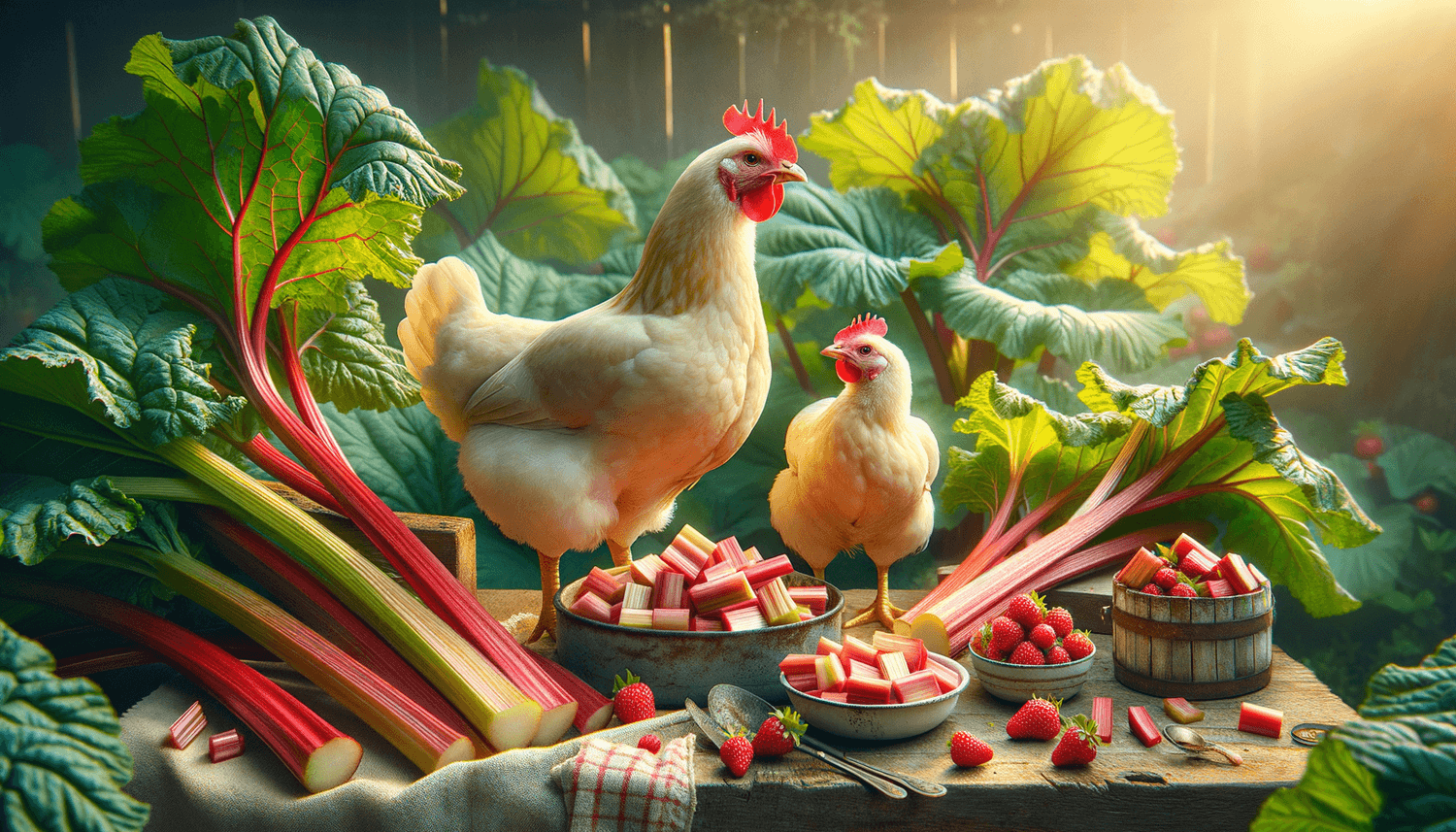If you’ve ever wondered whether your feathered flock can partake in some lovely rhubarb, you’ve come to the right place! Chickens are voracious eaters with an appetite for a wide variety of foods, and it’s always a delight to offer them something new to peck at. But should these crimson stalks make it onto their menu? In this blog post, we’ll dive right into the big question: can chickens eat rhubarb? We’ll chat about the importance of a balanced diet, the benefits or risks that rhubarb may bring, its nutritional value, and of course, the proper way to serve up this fantastic vegetable for your clucky companions.
Can chickens eat rhubarb?
No, chickens should not eat rhubarb, as it is not safe for them. Rhubarb leaves contain high levels of oxalic acid, which is toxic to chickens and can cause various health problems. Additionally, raw or cooked rhubarb stalks also contain some oxalic acid, so it is best to avoid feeding rhubarb to your chickens altogether to prevent any potential risks.
A balanced diet for chickens
Just like humans, chickens need a balanced diet to thrive and lead happy, healthy lives. This requires providing them with a variety of nutrients and ensuring the foods they consume are appropriate for their dietary needs. The cornerstone of a chicken’s diet is high-quality chicken feed, which should make up around 80-90% of their daily intake. This chicken feed is specifically formulated to contain the ideal balance of proteins, vitamins, and minerals essential for your flock’s well-being.
The remaining 10-20% of their diet can consist of treats to keep them engaged, entertained, and well-nourished. These treats can include various fruits and vegetables, such as leafy greens, berries, and melons, provided that they are safe for chickens to eat. It’s essential to avoid anything toxic, like rhubarb or avocado, which can pose a significant risk to your chickens’ health. By maintaining a balanced and diverse diet, you’ll ensure that your chickens remain healthy, happy, and laying delicious eggs. Always be sure to research any new treats or foods before offering them to your backyard flock.
Nutritional value of rhubarb for chickens.
As previously mentioned, chickens should not eat rhubarb due to its toxic nature. While rhubarb contains some vitamins, minerals, and other nutrients that could potentially be beneficial to chickens if it were not toxic, the risks associated with consumption far outweigh any potential advantages. Both the stalks and leaves of rhubarb contain oxalic acid, with the leaves having a significantly higher concentration.
Oxalic acid is harmful to chickens and can lead to serious health issues like kidney damage, difficulty in breathing, and in extreme cases, even death. As a result, it is recommended that chickens should not eat rhubarb, despite any nutritional content it may have, as the potential harm posed by the oxalic acid overshadows any potential benefits. This is why, when feeding treats to your chickens, it is crucial to select safe options that will not put their health at risk.
Nutrition table of rhubarb for chickens.
| Information | Description |
|---|---|
| Nutritional Value | Chickens should not eat rhubarb due to its toxic nature; any nutritional value is overshadowed by the potential harm posed by oxalic acid. |
| Suggested Serving Size | None. Chickens should not be fed rhubarb in any quantity. |
| Safe Feeding Practices | Rhubarb should not be fed to chickens. Look for alternative safe fruits and vegetables as treats. |
| Preparation | Not applicable, as chickens should not consume rhubarb. |
| Potential Risks | Rhubarb contains oxalic acid, which is toxic to chickens and can cause kidney damage, difficulty in breathing, and even death. |
| Hydration | Not applicable, as chickens should not consume rhubarb for hydration or any other purpose. |
| Digestion | Not applicable, as chickens should not consume rhubarb for digestion or any other purpose. |
| Seasonal Availability | Rhubarb is available in late spring and early summer, but should not be fed to chickens. |
| Other Benefits | Any potential benefits are overshadowed by the toxic nature of rhubarb for chickens. Seek alternative, safe treats to provide benefits to your flock. |
Alternative treats for your chickens
Now that we’ve established that rhubarb is not a suitable treat for your chickens, let’s explore some safe and healthy alternatives! Fruits and vegetables make excellent supplements to your chickens’ diet, as they provide essential nutrients, vitamins, and minerals, as well as variety and enjoyment for your flock.
Some popular fruits to give your chickens include apples, berries, watermelon, and bananas. Vegetables like leafy greens, kale, broccoli, and squash can also offer a nice treat. Remember to remove any seeds or pits from the fruits as they can be harmful to your flock.
Safe feeding practices
When introducing new treats to your chickens’ diet, it’s essential to follow safe feeding practices. Begin by offering them small amounts to see how they respond; it’s vital to monitor their behavior and health to ensure no adverse effects. Gradually increase the quantity of treats as your chickens become accustomed to them.
Additionally, ensure that all fruits and vegetables are thoroughly washed to remove dirt, chemicals, or pesticides before feeding them to your chickens. Cut them into manageable sizes to decrease the risk of choking.
Conclusion
In conclusion, while rhubarb might be tempting to offer your chickens, it’s essential to avoid doing so due to its toxic nature. Instead, focus on providing them with a balanced diet that includes safe and nutritious fruits and vegetables. Emphasize high-quality chicken feed, and prioritize the health and well-being of your flock by ensuring that they receive a diverse, nutrient-rich diet.

















